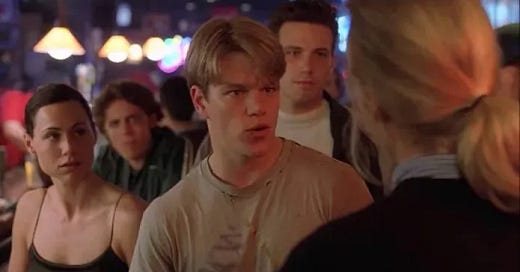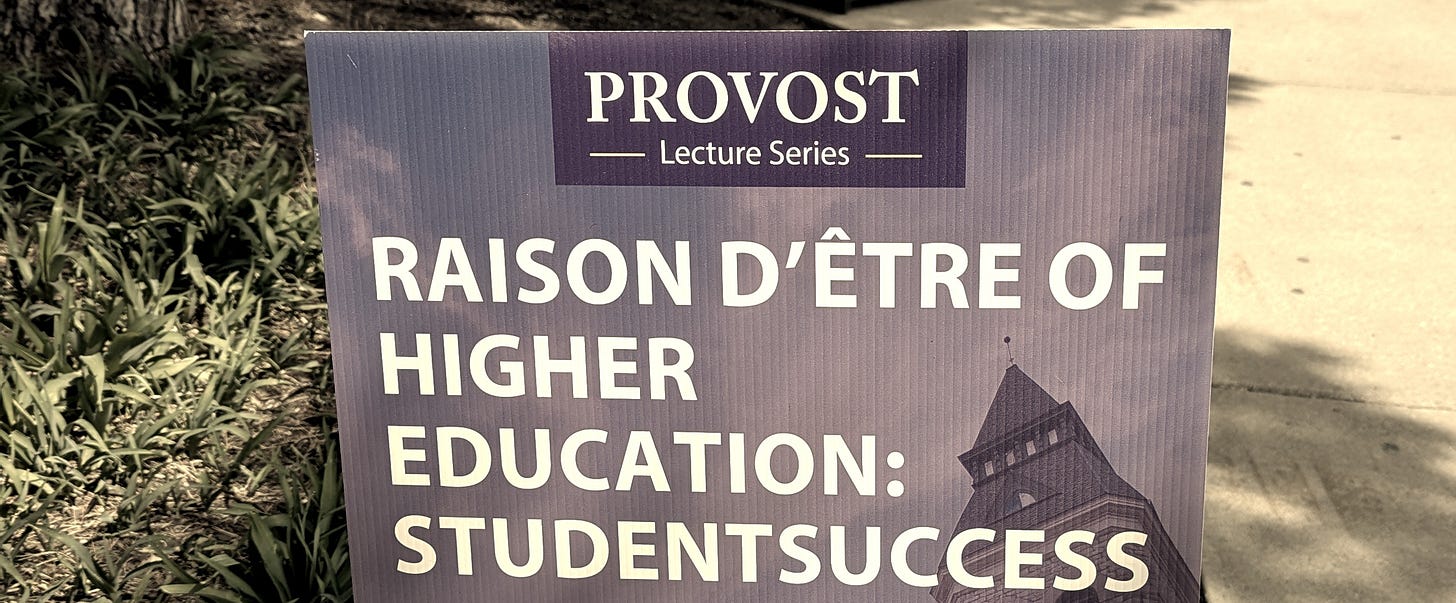"You wasted $150,000 on an education you coulda got for $1.50 in late fees at the public library." —Will Hunting (from the film Good Will Hunting)
Graduation season is nearly upon us. This time of year I find myself thinking back to this line by Matt Damon’s character in the film Good Will Hunting. It always evokes some absolutely essential questions:
What is education, and what is it for?
I have asked my students these questions periodically over the years. I get many of the answers you might expect. Education helps you build a career. It helps you become a better person. It helps you become a critical thinker. It helps you acquire the symbolic capital of having a degree. It provides important skills.
I agree that these things are important. No socially useless person should consider themselves educated. I support vocational schools and career relevant training. I think some version of critical thinking is important. But, does this really get at the heart of what education should mean?
French sociologist and theologian Jacques Ellul argued that many of our most common goals for education—like getting a job, building a résumé—aren’t really about education itself. They’re just means to other ends.
After World War II, Ellul observed something unsettling about modern society: we are very good at creating mechanisms—technologies, systems, policies—but very bad at deciding what those mechanisms are for. In other words, we know how to make things work, but we struggle to say why they matter. We invest enormous energy into doing things faster, more efficiently, more professionally—but we rarely stop to ask: to what end? What is the purpose of all this effort? What is the good life we hope education will lead us toward?
Ellul helps us understand why university administrators don't seem much better than students at answering these questions about education. Education leaders are part of the broader social system, just like we are, and are subject to similar constraints. We cannot expect our leaders to solve this problem for us.
This was illustrated for me just last month. I saw signs all over campus for our Provost Lecture Series. The speaker was a former President of the Northwest Commission on Colleges and Universities. The title: “Raison D'être of Higher Education: Student Success.”
I think I know what the speaker was going for with this title, but here is the issue. Student success cannot be the raison d'être of education because a raison d'être is an ultimate goal or reason for being. Student success, in contrast, is not really a goal, let alone an ultimate goal, but a consequence of pursuing the goal of education. Success in general ensues from trying to do something else. The word simply indexes a result, not an end. It begs the question, successful for what purpose?
For example, a student can be successful at something good or something morally horrid, something beautiful or something ugly. You can become the richest person in the world, and still make the world worse. The ends make all the difference! Instead of a true purpose, the highest levels of higher education can only offer means to other means. We are calling what we do “education,” but we don’t know what we are aiming at. Ellul would not be surprised.
So if that’s what education has become — what should it be instead?
This is a fair question, and I have an answer that I like, even though it is not compatible with higher education as it is typically envisioned. The idea comes from Plato in his Republic and is often paraphrased as follows:
Education is teaching our children to desire the right things.
The general idea is that ultimate values (the right things) exist, that we can know what those values are, and that we can participate in the highest values by desiring and loving them. These ultimate values are sometimes called Truth, Beauty, and Goodness. Plato believed that recognizing beauty and seeking its source was the beginning of true education. Beauty awakens desire, and through that desire, we begin our ascent—moving from love of the visible to love of wisdom, truth, and finally, the Good itself.
But this is not, as a general rule, what we educators do on university campuses. Most teaching today operates without reference to any shared vision of ultimate values—much less their role in human formation. Instead, we tend to see beauty as merely a social construct, truth as only situational and subjective, and goodness as reducible to social power. At the very least, we might reasonably agree that the search for ultimate values is part of the mission of education, even if we disagree about the details. Alas, even a reasonable search for the ends of education seems beyond institutional reach. Education at this level tends to operate differently.
So, what happens instead?
When a freshman arrives on a university campus, we assume they already know what to desire. We ask things like what career they want, what identity they wish to have, and how they would like to feel in our classes. If we accept Plato’s argument about how education is related to desire, then most educators assume students enter university already educated! Our job, from this perspective, is just to add a few finishing touches, such as technical skills or “critical thinking,” whatever that means.
This is why, on most campuses, you can get exactly what you want, like a hungry shopper at a mall food court — even if what you crave may ultimately harm more than it helps.
The result is that you can get a four year degree and graduate nearly as uneducated as when you began. You could be like the preppy character from Good Will Hunting, whose parents spent a fortune for a diploma that never became an education. To avoid this fate, you must be intentional about how you approach learning, whether you are enrolled in a traditional university or not. You need to ask what education really means.
This is why The Shadow Syllabus is important. We are creating a space for education as a journey toward desiring the right things. And, you don’t necessarily have to believe in Plato’s metaphysical Forms to take this approach seriously or benefit from this way of thinking. Even asking ‘what if?’ can begin to reorient how you live and learn. This may not be a large-scale institutional solution, but it can make a difference for you, if you let it.
Your first challenge: What difference would it make?
Let me give you a challenge, a pragmatic next step.
I want you to entertain an idea in the form of a question. The goal is just to think it through and what the idea would mean for your life and how you live. We will ask about beauty, specifically, because this is the ideal that is closest to our everyday lives. (You can go on to ask similar questions about Truth and Goodness, if you want.)
Here is the question: How would it change your life if love of beauty was an ultimate aim of education?
To go further, what would it mean for you to live as if every beautiful person, or every beautiful work of art, was an imperfect reflection of an eternal beauty that is even more real? What difference would it make if your attraction to these things was not just the result of a biological urge but also participated in a higher, more transcendent part of your being? What if the beauty in the world is pulling you toward a higher purpose? How might this change how you live?
Notice that I am not asking you to decide whether Truth, Beauty, or Goodness are real Platonic Forms. I am asking you to think about how their being real would change your life. (Remember, my goal is to help the human sciences make a difference in your life. So, we begin by asking pragmatic questions.)
If you really want to get more out of this exercise, start jotting down your thoughts in a journal. If you want even more value for effort, find a few friends and discuss it.
If you want some help, I highly recommend watching Roger Scruton’s classic documentary called Why Beauty Matters. A simple search should turn up a few free, streaming versions. If not, your local library can help you out.
Next week, we will delve deeper by looking at how our desire is shaped by social interactions. We will ask what difference it would make if we began our education not with learning ideas but by imitating extraordinary people.






Inscribed above the stage in UCLA’s Royce Hall: “Education is learning to use the tools which the race has found indispensable” (Ernest Moore)
There is no necessary privilege to instrumental job seeking behavior.